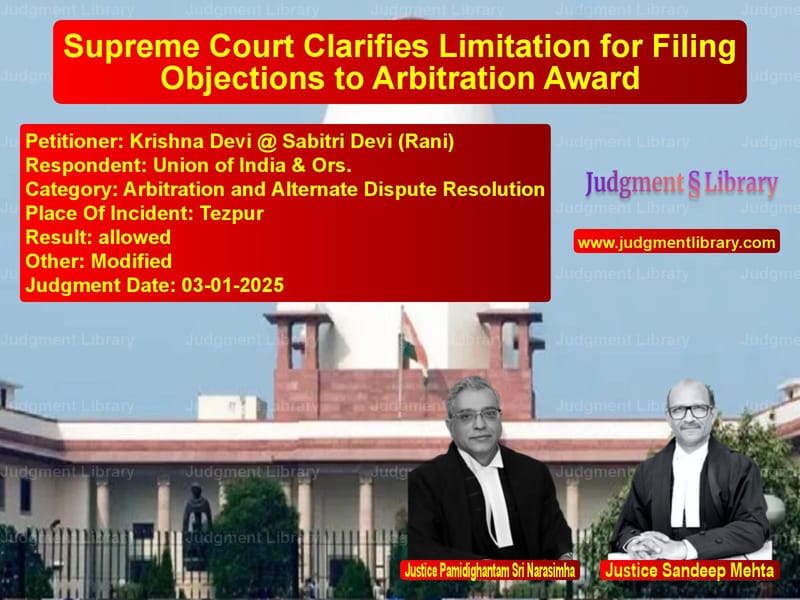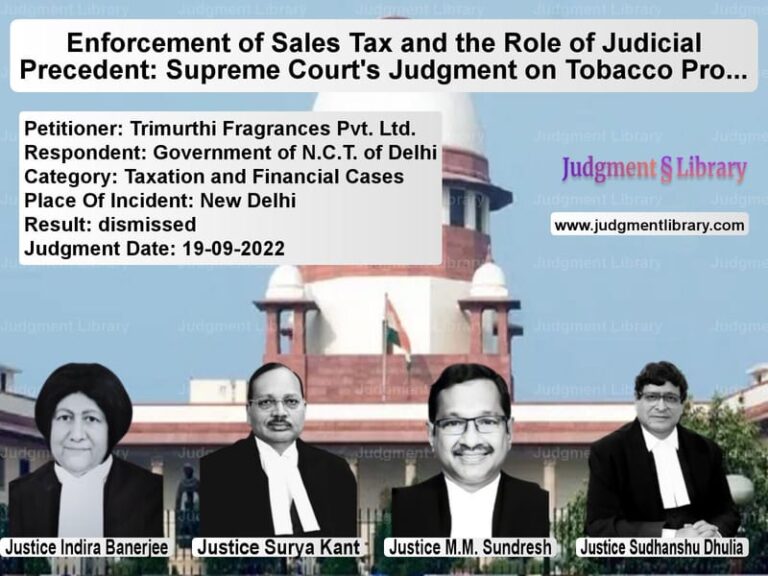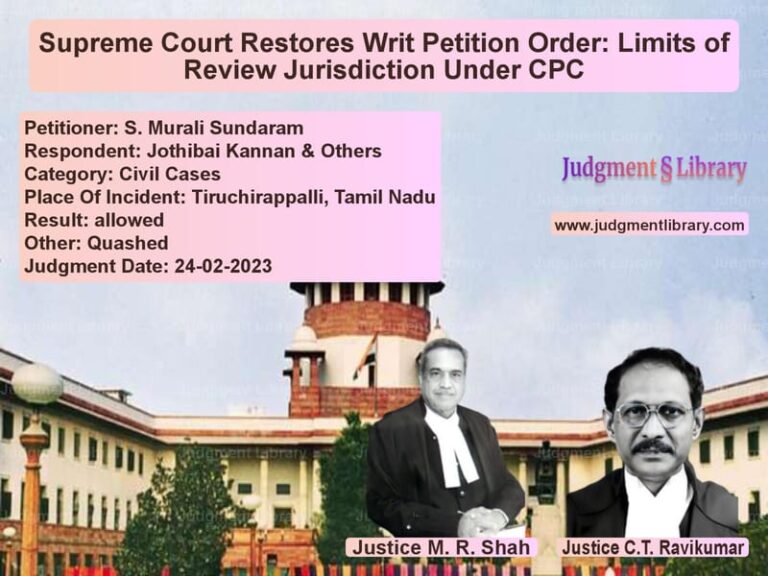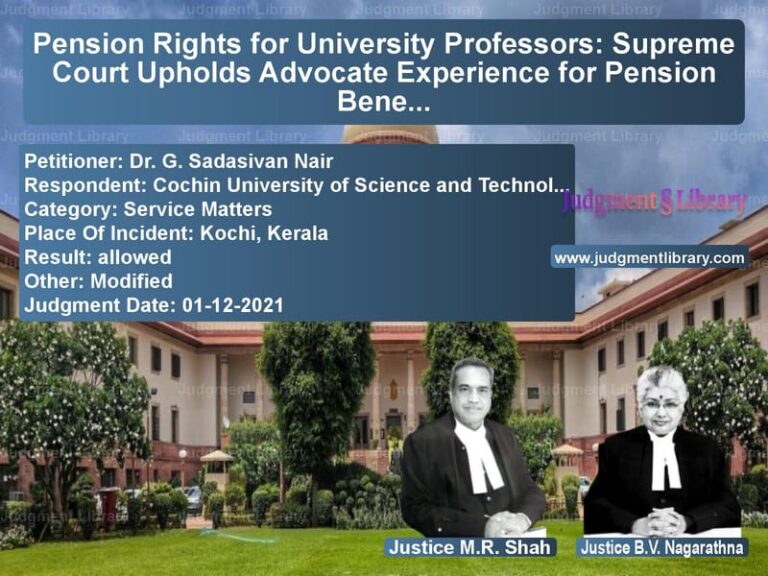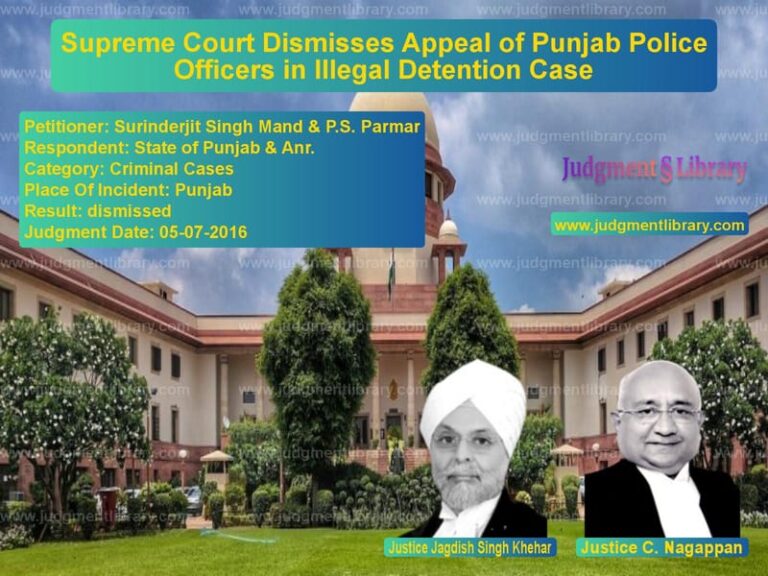Supreme Court Clarifies Limitation for Filing Objections to Arbitration Award
The case of Krishna Devi @ Sabitri Devi (Rani) vs. Union of India & Ors. revolves around a long-pending arbitration dispute under the Arbitration Act, 1940. The central question before the Supreme Court was whether the time limit for filing objections to an arbitral award begins when a party receives formal notice of the award or when the party becomes aware of the award’s existence.
The case is significant as it settles a key procedural issue in arbitration law, ensuring that award-debtors cannot delay proceedings by insisting on formal procedural steps when they are already aware of an award’s filing.
Background of the Case
The dispute originated in 1987-88 when M/S S.R. Engineering Construction, owned by the appellant’s husband, secured a work order from the respondents. The contract involved constructing a permanent armament section at Tezpur. The work was completed, and the firm raised a bill on 18.01.1993. However, the respondents failed to make the payment, leading to arbitration proceedings.
Chronology of Events
- 1993: Appellant’s husband requested arbitration, which the respondents declined.
- 1999: Multiple petitions were filed to appoint an arbitrator, initially dismissed due to jurisdictional issues.
- 2019: The District Judge, Sonitpur, appointed an arbitrator.
- 2022 (May 31): Arbitrator issued an award in favor of the appellant, directing the respondents to pay Rs. 1,33,47,268.92 with 9% interest.
- 2022 (September 21): District Judge directed the respondents to clear their share of the arbitrator’s fee.
- 2022 (November 18): Respondents formally received notice of the award after paying the arbitrator’s fee.
- 2022 (November 10): Appellant filed an application under Section 17 of the Arbitration Act for judgment in terms of the award.
- 2022 (November 23): The District Court dismissed the application, deeming it premature.
- 2024: The High Court upheld the dismissal, stating that the limitation period started only upon formal notice (November 18, 2022).
Petitioner’s Arguments
The appellant argued that the respondents were aware of the award as early as September 21, 2022, when the District Court directed them to clear the arbitrator’s fee. Thus, the limitation period for filing objections expired on October 20, 2022, and since the respondents filed no objections, the Section 17 application was valid.
The appellant relied on previous Supreme Court judgments:
- Nilkantha Sidramappa Ningashetti v. Kashinath Somanna Ningashetti (1961): Held that formal notice is not necessary; awareness of the award’s filing is sufficient.
- Deo Narain Choudhury v. Shree Narain Choudhury (2000): Confirmed that oral communication of an award’s filing meets the legal requirement.
- Ch. Ramalinga Reddy v. Superintending Engineer (1999): Emphasized that formal written notice is not mandated.
Respondent’s Arguments
The respondents contended that they formally received notice of the award only on November 18, 2022, and the limitation period should be calculated from that date. They argued that:
- Section 14(2) of the Arbitration Act, 1940 explicitly requires a formal court-issued notice.
- The directive to clear the arbitrator’s fee on September 21, 2022 did not constitute a legal “notice” of the award.
- If informal awareness was accepted, parties could dispute the “awareness date,” leading to inconsistencies.
Supreme Court’s Analysis
The Supreme Court examined the relevant laws:
- Section 14(2) of the Arbitration Act, 1940: Requires that the court notify parties when an award is filed.
- Article 119(b) of the Limitation Act, 1963: States that the limitation period for objections starts from the date of “service of notice” of the award’s filing.
Key Observations by the Supreme Court
- “The respondents had notice of the award’s filing on September 21, 2022, when the District Court directed them to pay the arbitrator’s fee.”
- “Waiting for a formal court-issued notice allows award-debtors to unjustly delay proceedings.”
- “If a party is aware of the award, it must act diligently and file objections within the prescribed period.”
The Court ruled that the limitation period expired on October 20, 2022. Since the respondents failed to file objections within this time, the appellant’s Section 17 application was valid and should not have been dismissed.
Final Judgment
The Supreme Court set aside the orders of the High Court and District Court and allowed the appellant’s Section 17 application. It directed the District Judge, Sonitpur, to dispose of the case within five months.
Conclusion
This judgment clarifies an important procedural issue in arbitration law. By affirming that a party’s awareness of an award—rather than a formal notice—is sufficient to trigger the limitation period, the Supreme Court has ensured that arbitration proceedings are not unduly delayed. The ruling serves as a reminder that courts will not permit award-debtors to exploit procedural loopholes to delay justice.
Petitioner Name: Krishna Devi @ Sabitri Devi (Rani).Respondent Name: Union of India & Ors..Judgment By: Justice Pamidighantam Sri Narasimha, Justice Sandeep Mehta.Place Of Incident: Tezpur.Judgment Date: 03-01-2025.
Don’t miss out on the full details! Download the complete judgment in PDF format below and gain valuable insights instantly!
Download Judgment: krishna-devi-@-sabit-vs-union-of-india-&-ors-supreme-court-of-india-judgment-dated-03-01-2025.pdf
Directly Download Judgment: Directly download this Judgment
See all petitions in Arbitration Awards
See all petitions in Enforcement of Awards
See all petitions in Judgment by P.S. Narasimha
See all petitions in Judgment by Sandeep Mehta
See all petitions in allowed
See all petitions in Modified
See all petitions in supreme court of India judgments January 2025
See all petitions in 2025 judgments
See all posts in Arbitration and Alternate Dispute Resolution Category
See all allowed petitions in Arbitration and Alternate Dispute Resolution Category
See all Dismissed petitions in Arbitration and Alternate Dispute Resolution Category
See all partially allowed petitions in Arbitration and Alternate Dispute Resolution Category

